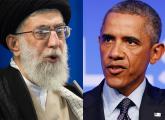“Why is Obama so concerned with sealing a deal with Iran? There’s no logical reason”
Abdulrahman al-Rashed
Secondly, American reassurances that concessions will not be made have proven not to be true on several occasions. The last of these concessions was America’s acceptance of 1,500 uranium-enriching centrifuges after it said it won’t allow more than 500. This came in addition to a series of concessions Washington made in the field of boycotted and frozen assets.
Expanding influence
Thirdly, the Iranians made a comment regarding their demand to expand their influence in the region. Although Washington denies that it will accept such conditions, there are doubts prevailing in the region among those who worry that Iran will be left free to further sabotage the region. American stances in favor of Iran’s interests in Iraq and Syria strengthen these doubts. The most recent example was President Obama’s statement regarding Syria and his pledge to fight the Islamic State of Iraq and Syria (ISIS) organization while refusing to punish the Syrian regime which is behind the crisis and which has killed more than a quarter of a million citizens and displaced more than eight million more.
Fourthly, there is the nuclear program itself. The U.S. seems to have backtracked on its pledge to prevent the Iranian regime from possessing the capability to produce nuclear weapons and this will lead to a change in the balance of power in the region in a very dangerous manner. We, as well as the West, are aware of the fact that Iran does not need nuclear energy to meet its energy needs because it holds the world’s fourth-largest proven crude oil reserves – that is more than Iraq, Kuwait and the United Arab Emirates. So why would Iran spend huge funds for nuclear energy when it can produce petroleum for a very low cost? It’s because Iran seeks to produce nuclear weapons and a country with such a mentality and persistence indicates it has dangerous and hostile intentions.
A dangerous phase
If negotiators in Muscat allow Iran to pursue its nuclear program, we will enter a very dangerous phase. The balance of regional power will be disrupted and this will force regional countries – mainly Saudi Arabia, Turkey and Egypt – to look for means to build a deterrent nuclear power. This will make the Middle East region, which threatens the world with al-Qaeda and ISIS, more dangerous due to the presence of five nuclear countries including Iran and Israel. Why is Obama so concerned with sealing a deal with Iran? There’s no logical reason. We saw how American sanctions succeeded in exhausting the Iranian regime and led it to the point of Tehran thinking that its nuclear program may led to the collapse of the regime. However, the porthole which Obama’s administration opened for the regime in Tehran pushed the Americans, and not the Iranians, to present more concessions in exchange of promises from Khamenei’s regime. These promises are not based on halting the nuclear program but only slow down its implementation. We don’t criticize the negotiations because we refuse that Western countries reach an agreement that ends the crisis with Iran. Any agreement that tames the hostile Iranian political mentality and disarms its nuclear weapons serves the interest of the entire region. However, we do not think that the suggested agreement curbs these nuclear aspirations and it does not deter the chaotic mentality which Tehran has practiced non-stop since the 1980s. What gives doubts is that the Americans have distanced regional countries from the negotiations with Iran and have exchanged secret messages – as exposed by the Israelis who revealed that secret communiqués have been exchanged with the Iranian supreme leader himself. At the same time, we also see how Washington adopts stances that are biased toward Iran in Syria and Iraq!
Muscat’s negotiations hint that an agreement may be reached before the November 24 deadline for a nuclear deal, an agreement that may alter the region’s history if it is to be reached.
إلى أين تقودنا مسقط؟
عبد الرحمن الراشد/الشرق الأوسط
11 تشرين الثاني/14
الرئيس الأميركي باراك أوباما متحمس لبدء تاريخ جديد مع إيران، وإعادة العلاقة الجيدة مع طهران التي كانت حليفا مهما في عهد الشاه حتى سقوطه. ولهذا يلتقي الأميركيون والأوروبيون مع الوفد الإيراني في العاصمة العمانية في سباق زمني للتوصل إلى حل لطموح النظام الإيراني النووي. ولنا، في منطقة الشرق الأوسط، مع هذه المفاوضات إشكالات جدية؛ أولها السرية! فقد تعمدت إدارة أوباما التكتم على اتصالاتها مع طهران ومفاوضاتها، حتى عن حلفائها الإقليميين. وهو أسلوب يخالف نهج الولايات المتحدة في اتصالاتها، مثل مفاوضاتها مع كوريا الشمالية؛ حيث شاركت الدول المعنية في المنطقة الأسرار والقرار، فأدخلت الغرفة كوريا الجنوبية، واليابان، والصين، وروسيا، مع وفد الولايات المتحدة. أما في مفاوضاتها مع إيران فقد أغلقت الباب في وجه دول حليفة ومعنية مباشرة، مثل مجموعة دول الخليج، وتركيا، ومصر، وكذلك إسرائيل. وثانيها أن ما صدر عن الإدارة الأميركية من تطمينات بعدم تقديم تنازلات اتضح أكثر من مرة عدم صحته، وكان آخرها تنازلها عن موقفها بألا يسمح بأكثر من 500 جهاز طرد لنجد أنها قبلت بـ1500. إضافة إلى سلسلة تنازلات قدمتها واشنطن في مجال المقاطعة والأموال المجمدة.
وثالثها ما تحدث به الإيرانيون عن مطالبهم بأن يسمح لهم بمد نفوذهم في المنطقة.
ومع أن واشنطن تنكر أنها ستقبل بمثل تلك الشروط، فإن في المنطقة تشككا في أن تترك إيران حرة تخرب المنطقة، بأكثر مما تفعل حاليا. والذي يعزز هذه الشكوك المواقف الأميركية التي تميل لصالح إيران في العراق وسوريا، وآخرها تصريحات الرئيس أوباما حول سوريا؛ فقد تعهد أوباما بمحاربة تنظيم داعش رافضا عقاب النظام السوري الذي هو مصدر الأزمة، وقد أفنى أكثر من ربع مليون إنسان، وشرد أكثر من 8 ملايين سوري.
ورابعها المشروع النووي نفسه. فالولايات المتحدة يبدو أنها تراجعت عن تعهداتها المتكررة السابقة، بمنع النظام الإيراني من امتلاك القدرة على تصنيع سلاح نووي، وهذا سيتسبب في تغيير ميزان القوى في المنطقة بشكل خطير جدا. نحن ندرك، مثلما يدرك الغربيون، حقيقة أن إيران ليست في حاجة إلى الطاقة النووية لتلبية حاجاتها من الطاقة، فهي الدولة الرابعة في العالم في احتياطات مؤكدة من البترول، تسبق العراق والكويت والإمارات. فلماذا تنفق مبالغ هائلة على الطاقة النووية، وهي تستطيع إنتاج البترول بتكلفة رخيصة جدا؟ السبب، إيران تسعى لبناء سلاح نووي، ودولة بمثل هذا التفكير، والإصرار، تعني أنها ذات نوايا عدوانية خطيرة.
وإذا رضخ المفاوضون في مسقط للسماح لإيران بحق الاستمرار في مشروعها النووي، فإننا نكون بذلك قد دخلنا عهدا خطيرا جدا. سيعني اختلال ميزان القوة الإقليمية، مما سيضطر دول المنطقة، وعلى رأسها السعودية وتركيا ومصر، إلى البحث عن وسيلة لبناء قوة ردع نووية موازية لإيران. وهذا سيجعل منطقة الشرق الأوسط التي تهدد العالم بـ«داعش» و«القاعدة» أكثر خطرا على العالم، بـ5 دول نووية، بينها إيران وإسرائيل. لماذا أوباما حريص جدا على إبرام اتفاق مع إيران؟ لا يوجد سبب معقول. لقد شاهدنا كيف أن العقوبات الأميركية نجحت جزئيا في إرهاق النظام، وأوصلته إلى مرحلة التفكير بأن مشروعه النووي قد يعرض كل النظام للانهيار لاحقا. إلا أن الكوة، التي فتحتها إدارة أوباما للنظام في طهران، دفعت الأميركيين، وليس الإيرانيين، لتقديم المزيد من التنازلات مقابل وعود من نظام خامنئي، في مجملها لا توقف المشروع النووي، بل تبطئ من سرعة تنفيذه فقط. وعندما ننتقد المفاوضات، فليس لأننا نرفض أن تتوصل الدول الغربية إلى اتفاق ينهي الأزمة مع إيران، بل إن أي اتفاق يروض التفكير السياسي الإيراني العدواني، وينزع سلاحها النووي، هو في صالح المنطقة كلها، لكننا لا نعتقد أن الاتفاق المطروح حقا يقلّم السلاح النووي، ولا يردع التفكير الفوضوي الذي تمارسه طهران بلا توقف منذ الثمانينات. والذي يجعلنا نشك هو أن الأميركيين غيّبوا دول المنطقة عن المفاوضات، وتبادلوا إرسال رسائل سرية، كما فضح أمرها الإسرائيليون، بأنه تم تبادلها مع المرشد الإيراني شخصيا. وفي الوقت نفسه، نحن نرى كيف تتبنى واشنطن مواقف منحازة لإيران في سوريا والعراق!
مفاوضات مسقط توحي بأن الاتفاق بات قريبا؛ بحيث يسابق الموعد النهائي المضروب في هذا الشهر، والذي إن تم قد يغير تاريخ المنطقة.




















